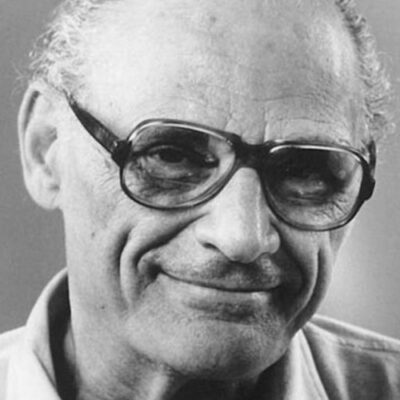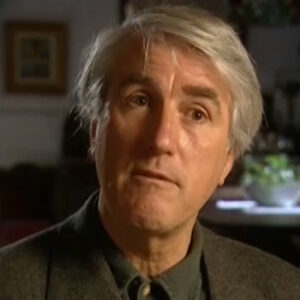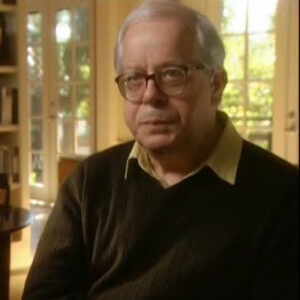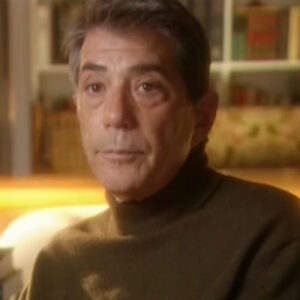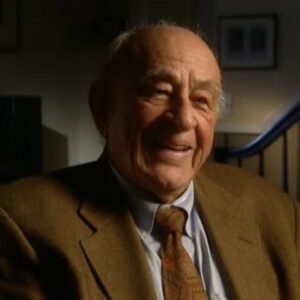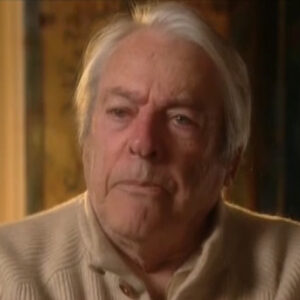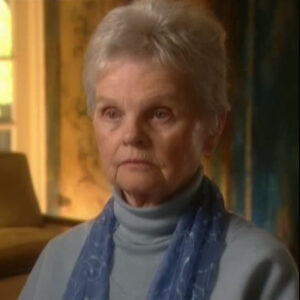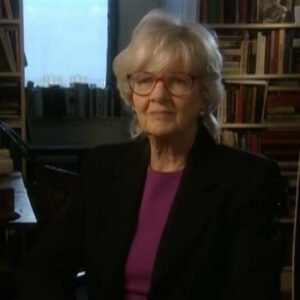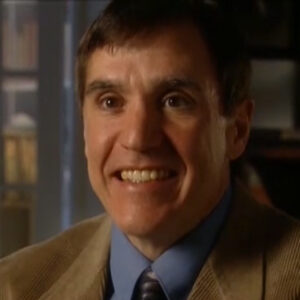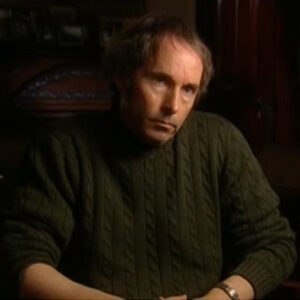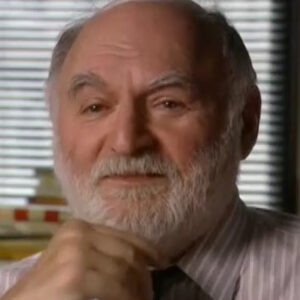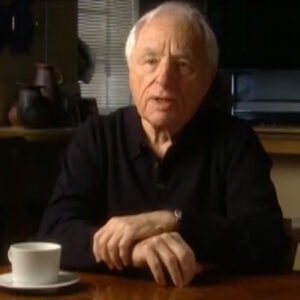Speaker Well, the McCarthy era very much, or is it more like a book that you once read and is sitting on a shelf collecting dust?
Speaker There are several reasons why I think about the blacklist.
Speaker One is that I wrote a big book about UAC experiences for the University of Texas press, which came out two years ago. Another, as I’m writing another one about the FBI pursuing me for 26 years. And also, I was very active in the attack as an matter I was one of the co leaders of that. So the whole thing is still very much alive with me. But much more important than that is the fact that I see what’s going on in the country today in a way that I find extremely disturbing and very reminiscent of the McCarthy days that he left days. I guess you know that McCarthy is just a Senate version of the new act, which was the House version of the same damn thing.
Speaker Yes, I want to know. I mean, does it still emotionally touch you? Do you still feel anger, disappointment, sadness?
Speaker Well, you know, I was a very young beginning writer when I was grabbed by the huge.
Speaker And I only had two credits at Universal, both kind of interesting credits with people who became big stars as a result of my writing their first scripts. And I have always felt that my opportunity to become an important Hollywood writer was missed because of the blacklist. I, I like to think that there’s no writer with a soul so that that never to himself has said. Whereas my Oscar.
Speaker So a sense then that the blacklist stays with you on an emotional gut level. Stillman writing in the sort of Kazan award aside, that I guess I’m talking about is in your internal life, does it still matter to you? You’re still hurt.
Speaker I think it does still hurt. I think that it had such a profound effect on everything that happened to me after that. That I can’t get away from it. I am here, I am getting old, and I still have that UAC with me. That’s not very nice.
Speaker I think that’s true for a lot. I think that’s true for almost. Actually, not almost everybody. I think that’s true for everybody. They had their lives altered by Hugh Act or the blacklist.
Speaker Well, we certainly had our lives altered profoundly. I had some good experiences as an accidental result of that. And the. Title of my book is Hollywood Exile or How I Learned to Love The Blacklist, which is partly a joke and partly a play on how I learned to love the bomb because I went to Europe. And I had a wonderful time there, I had the best of everything. I found Hollywood over there and Spain. Surprisingly enough, working in Franco’s Spain. But. Nevertheless, I think you would have been interesting for me to have the opportunity to become a big shot here in Hollywood because I have all the eye color, all the accoutrements. Look, I get to do it.
Speaker Yeah, of course. When you first become aware that a dark cloud was descending on Hollywood.
Speaker Well, that was very easy to say, is to answer, because it happened in September of 1947 during the big hearings in Washington when the ten Hollywood ten appeared, as well as eight or nine other people who were subpoenaed. And my name came up. I was named as a communist sympathizer by a screenwriter named Jack Muffett, who I never know before and haven’t I have known since. Nevertheless, when that happened, it got all over the trade press because my man, who was a lawyer there at Charles Katz, who had worked with me and the time when I was president of the screen readers skilled and negotiated their first contract. He and I had worked together talking to the producers about that. He got up at the hearing room and said, You can’t say that about Mr. Gordon.
Speaker He’s a client of mine. He’s not here to defend himself. And I reject this all out of order.
Speaker And they would let him go on speaking. And they actually threw him out of me out of the hearing, out of the room.
Speaker But before that, I mean, before that moment when your name was named the forty seven Hugh. Before everybody went to Hollywood, was there a sense as the 19 were being called, you know, that this was the beginning of the end?
Speaker Did you guys all have that feeling that just.
Speaker The feeling actually came out of the fact that the conference of studio union was having a big lockout, which was almost studios, and especially at Warner Brothers, and it was very brutally put down by the police who were on the pay of Warner Brothers at the time. They were the pictures were attacked with chains and tire irons, and they fought back, too. But the tickets were arrested for the violence and the scabs were going through a warrant. And we who were not involved in a strike. My wife and I, for example, we contributed money to the funds to keep the strikers going. And we were very much aware and very much sympathetic. And we would listen to all this. We knew that the change had occurred in America, that someone who was the president of General Motors, for example, had the nerve to say what’s good for General Motors is good for America. And this whole change from the Rosewell period, from the war period was beginning to emerge and the trade union movement was under attack. Everything progressive was under attack. And we felt that we were entering a very, very seriously bad period.
Speaker I’m going to talk over this so that you get it. I understand.
Speaker In terms of Hollywood, when you heard that Hugh Act was coming out or that they were sending people to Washington, they were going to be hearings. Did you feel that it was going to affect that the town, the way did it end up? Was there? Well, going to keep talking.
Speaker I mean, I. I was just. We are OK. OK.
Speaker When he recognized that they were investigating, quote unquote, communist influence in Hollywood. Did everybody sit around and go, the jig is up?
Speaker No, no, no, no, we didn’t take this. You act very seriously for quite a while. We felt that they were so out of line that the whole thing was so improper and really illegal that no committee had the right to ask questions like this.
Speaker Now, committee with committees of Congress are supposed to be forms for the purpose of legislation. There was no legislation in prospect. And in fact, for all the years that they were in that they existed, there was no legislation that came out of the whole thing was improper and illegal.
Speaker And we felt that the people, especially thinking people and intellectuals and artists and so on, were all against them, which they were. To begin with, and that they would be sort of driven out of town. That’s how we felt.
Speaker And why do you think that that’s not how it played out. In fact, it played out quite the opposite way.
Speaker Oh, well, that’s a big question you’re asking. Yeah, there are a lot of reasons. Mostly I think it’s because of the whole change in the atmosphere after World War Two, after the atom bomb was dropped after the.
Speaker And the interesting thing, if I can interrupt, is that, you know, the blacklist starts two years before the Soviets test their own atom bomb. Why is it that the modals rolled over and play dead before the committee in your mind?
Speaker Well, if you know anything about Hollywood, you know that two things, first of all. Are a bunch of people who only are interested in the bottom line, which is making studios profitable.
Speaker It’s not of Hollywood. It’s not a business of making art. Hollywood is a business of making money. The business of Hollywood is business and anything. As a matter of fact, the fact of the matter is, a lot of the moguls here, including some well, not at all progressive like had been there and Sam Goldman and so on. We’re against the Hugh Act and against the hearings. They didn’t want to be bothered firing people having all this trouble. They didn’t want this publicity about their being communists in Hollywood. They were against all that. But it was at the conference in New York. It was called the Waldorf Conference, where the people who really own and run Hollywood are the big investors, the big banks, the people who own it. And in New York, they are the ones who got the moguls together at the Waldorf Astoria. And they said, hey, you go along with this, you fire these reds because otherwise we’re going to have picketing of the theaters, we’re going to lose an audience and we’re gonna have a lot of negative publicity about them. That’s one answer. There’s another answer which is less popular. But I’d like to voice it, which is that anti-Semitism was was very much something that was coming about in those days. It’s always been here, of course, Father Coughlin. And Henry Ford and and so on and so forth. Hitler did have his admirers in this country. He had people supporting him.
Speaker It’s funny that you say anti-Semitism because this isn’t about Jews. This is about communists.
Speaker Well, let me say that a lot of people think they’re all all Jews are communists and all communists are Jews. And this was especially considered that and at Hollywood, it was considered a communist, not a communist enclave or a Jewish enclave. The Jews had made Hollywood. There’s no question about that. And are reasons for that is something I would be very happy to explore with you. But because it they felt vulnerable as Jews, people like Warner and Kahn and Mayor and Goldwin, they felt very vulnerable to anti-Semitism. And the Hue extramarital had people like Rankin on it who made a real determined effort to tie Hollywood with the Jews. They did things like asking all of the actors who came up like John Garfield.
Speaker What was your original name? It happened to be Julie Garfinkle. Well, a hell of a lot of actors had Jewish backgrounds and all changed their names because in those days, anti-Semitism was not accepted. Fact of life. You didn’t become a movie star if your name was Garfinkle. Saw that there was a real fear among many people on this in this community that you act would. Light the fires of anti-Semitism against Hollywood. And this is one of the other reasons why it was important that that they cooperate. And finally, there’s a third reason, which is that there had been a big struggle in Hollywood during the war to create aggressive, honest, militant trade union movement called the conference, the studio unions as different from the IATSE, which is the old sweetheart union of the projectionists, the studio workers and so on. Camera man, if you’ll excuse the expression and and the conference of studio unions, led by a man named Herb Sarrell, had actually succeeded during the war because of war circumstances in developing a whole group of unions which stood for decent, honest, militant trade unionism. Well, one thing that the studios wanted to get rid of was decent, honest, militant trade unionism. And they went really went to work with a lockout against the conference of studio unions workers. And this was part of the whole economics of the period of Hollywood. In fact, I think the whole blacklist, which we haven’t yet talked about, was a precursor to a much larger kind of atmosphere against all dissent, against all kinds of things.
Speaker I want to hold off on that. I want to get to that over the course of our conversation that it seems to me that’s one of the legacies of it.
Speaker So I don’t want to jump the gun just just yet, if you don’t mind. So.
Speaker How did you then and your friends? Come to know that there was a blacklist at that moment where you’re working and the next moment you’re not.
Speaker Well, it didn’t happen in a moment that happened because the Hollywood Ten was cited for contempt of Congress and they had to go to court as potential criminals, as people who with contempt of Congress. And we all believe that this was going to be thrown out of court because they had played the First Amendment of the First Amendment means anything. It means the right of free speech and free association. It also means the right, as has been many times affirmed by the Supreme Court, means the right not to speak, not just the right to associate, to speak. And therefore, we thought there was no question, but that was the First Amendment protection that this whole matter would be thrown out. But no, they were convicted in the courts and they were convicted in the appeals courts. And finally, in 1952, the Supreme Court upheld this conviction, ignoring the First Amendment, which was such a shock to us. Until that time, there had really been no extensive blacklist. It only been what the producers or the owners of the Waldorf said, don’t hire these 10 men until they clear themselves. Well, we thought that was a temporary situation which would be corrected by the courts, but it wasn’t when the ten went to jail. We knew the jig was up.
Speaker I think it was 1950, right?
Speaker What was one Supreme Court decision? Yes. He was 19. It was 1950 s when they started going to jail. Right. And that was the beginning of the Korean War, which also elevated the whole anti-communist hysteria in this country.
Speaker Hold on one second. We get that over with our street. OK. As my voice. All right. All your voice. Find occasion.
Speaker Cargo’s buyers want to make sure that there’s not so.
Speaker I’m going to go back. You’ve answered this question once before. But I’m going to do it again, if you don’t mind.
Speaker It’s as safely as you can’t how did you come to find out that you had been named?
Speaker Well, I was working at Universal, I’d written two scripts there. I had talked to me about giving me a contract because I was so pleased with the two scripts I wrote. One was for. Rock Hudson. One was for Tony Curtis and both of these people became stars. I’ve been they’ve been really be bleak picture players before that. And Tony Curtis came to me when I was writing my first script and said, Hey, Bernard. Hey, Bernard. He said, my name is really Bernie, too. I’m Bernie Schwartz. And so we’re all friends, you know? Well, when I met him 20 years later at the jewelry store in Beverly Hills and I said, hi, Bernie Schwartz gave me a cold fish.
Speaker They’re already short sale. Not very sure, but you’ve written two scripts for Universal.
Speaker It seems as though the skies, nothing but blue skies.
Speaker All right. I’ll tell you what happened. I was working for first of all, the executive producer was Leonard Goldstein. It was a real big shot there. And that was the first picture I wrote to Tony Curtis picture. And I had almost nothing to do with him, I was working for another man who was his assistant. And we got along great, and as a result of the success of this first picture, that Tony Curtis picture excuse me. They immediately signed me to another picture, which was a Rock Hudson picture. And the second picture was one which was going to be produced by the man named Bill Allen, who had been my first producer as a system to give us, said this was going to be his first motion picture.
Speaker It happens that Bill Allen was a, what shall I say, a progressive or a member of the Communist Party or something like that in his day. And he liked me very much. And there was not hardly any secret about our political interests and sympathies. And when the Western was Rock Hudson was well along and they were still talking about a contract for me. He came to me a very white face whispered in my ear. There’s trouble brewing. There’s trouble brewing. And he finally said, You’re gonna be subpoenaed.
Speaker Well.
Speaker That meant the jig was up, because if I was gonna be subpoenaed, I would become publicly known as a as a communist and I would be fired by Universal, I wouldn’t be able to work anywhere else. And what happened was that we finished. They let me finish a script, which was Rock Hudson, which I can’t remember name of, and it was started out as bad man with a gun, but it was something else. And I hope I could get that name so you could all go to see this picture.
Speaker I guess the question is, when you got subpoenaed, was there any question in your mind what you were going to do? Was there any handwringing? Was there any doubt how you were going to behave before the committee? Because your career.
Speaker Well, let me point out that when I was working at Universal, they had the first big hearings in Hollywood who act was out here and had these big hearings where somebody named like 150 people who were coming. I never knew there were that many cameras in Hollywood, but he named all these people. I think some of the more communists and some of them were probably most of them were or had been at some point passing through the party.
Speaker And I sat in my room working on my script. And then the next office, there were a bunch of writers who were all gathered around the television screen, a little portable screen to watch the show that was going on at a huge work in Hollywood. And they were inviting me in.
Speaker And I’m expecting my name to come up any minute and I’ll say, no, no, I’ve got to keep working. I’ve got to turn out pages. I wouldn’t do that. And I was waiting for the axe to fall. And that was during my days that it didn’t happen then. So matter of fact, I’m in a peculiar position and I don’t know to this day. I was not publicly named. I don’t know who named me. I have a lot of guesses, but I don’t know who actually name they and got the committee on my back.
Speaker But I knew that with all my friends being blacklisted, that the time would surely come that I wouldn’t fall through the cracks. And there it was.
Speaker So let me ask you. OK. OK. Any doubt in your mind you’re going to do.
Speaker No, because I already had so many of my friends go through this and let me say that apart from principle. I mean, we I know damn well that I was not going to cooperate with the House un-American Activities Committee because I consider them a blot on the escutcheon of America. Terrible black period was coming on. That they were that they weren’t business not to find out what communists had done in Hollywood, which was ludicrous because that never had happened and couldn’t happen. They were here to create an atmosphere of dissent in the country so that nobody could speak out against whatever that was going on that they didn’t like even.
Speaker Well, as the Korean War or whatever, whether it’s racism, depression, problems of any kind, no dissent, no dissent. Keep your mouth shut and let the people do what they want. And that was the reason for the Hue act, in my opinion. That was the purpose of it. That’s the way it worked. And that was the result of that. We all for many, many years. People were afraid to open their mouths in this country because of you. Anyway, I knew that this is why you act represented. There was no way that I could agree to validate them by going out and giving them names or cooperating or saying anything good. But the other reason is less well understood, which is that as a member of the party. Most of my friends were members of the party. These are people I eat with an.
Speaker Didn’t sleep with them, exactly one of them. Yes, I married, but.
Speaker But these were the days when my family. How do you go and talk about these people and call them and say that they were evil people or trying to destroy their country? It’s impossible to think about. And it just seemed I still to this day, find it hard to understand anybody who cooperated with the committee after having been a member of the party and having lived with these people and worked with them and tried to make a better America together with them and struggled with them. How do you go on, turn on such people? It’s a personal thing to you. Don’t betray the friends that you have.
Speaker OK, let me play devil’s advocate. If you’re a communist, especially by 51 herself. Are you not committed to the overthrow? Of the United States. Aren’t you committed to revolution? Aren’t you committed? To subterfuge and sabotage. Isn’t that what it’s about?
Speaker Well, I don’t I don’t know of any action by communists or the Communist Party which went towards overthrowing the federal government or or towards sabotage or anything else.
Speaker We were in business here. The people I know, the people I was worth fighting for back against, the bad things in this country, fighting against oppression, fighting against war, fighting against racism.
Speaker You know, racism was like in this country during those. I didn’t get into Columbia University, although I had very high marks because they had a quota for Jews. Anti-Semitism was taken for granted in this country. But worse than that. There was the racism against blacks and in this part of the world, the racism against Latinos. We had a situation where they had the twelve, eight or nine of them were convicted and sentenced to death on purely trumped up charges. The Communist Party, who got the lawyers together and did everything to save them from death and got them freed. Finally for a voice at the Scottsboro Boys of the South, was an earlier example of this, so that we as communists were trying to make this a better country, a better world, especially for the poor and the dispossessed and so on. That’s what we were doing. That that’s what we actually did. And this whole talk about revolution taking over the US government is just such nonsense. There were a few thousand of us. How many were there, you know? And yet, you know, I’m not doing a book about the FBI pursuing me for twenty six years and creating a file this thick as though there was anything I could do to harm this country.
Speaker So. Did you ever get an opportunity to defend yourself? Did you ever get an opportunity to clear yourself?
Speaker Not till now. It’s important you never got a call right now.
Speaker Well, I got subpoenaed and I went down to the federal buildings and answer my subpoena. There I had a supposed to go and I prepared a statement, which I knew they wouldn’t let me read. But then I’m a writer. So I wrote a statement and. And it happens that this was kind of the bottom of the barrel, you see. This was fifty two already. I had come very late into the picture as a writer, which is one reason I was not named by this stool pigeons who named all the other writers. They didn’t know me as a writer. I’ve been a reader. I’ve been a story department. I was not known by a lot of these people as a writer. Nevertheless, when I went down to earth to be a witness.
Speaker The.
Speaker Lawyers and the doctors had also been subpoenaed. There were doctors working at the Cedars Sinai Hospital who were thrown out because they’d been subpoenaed and they wouldn’t talk to the committee. There were lawyers who had a lot of problems, too. They got up and they talk back to the committee. So act so vehemently and so persistently and so loudly that the committee couldn’t shut them up. For once, the committee could not shut up the witnesses who were hostile witnesses. And they ran out of time and they adjourned before they got to me. So I got then I got a telegram saying, you’re still under subpoena. You’ll be called later. And I know I was called later, but that was very they were very dramatic moments down there during those hearings. One of the doctors, one the let me say one of the doctors who had won medals during the war. He took his metal they throw on the table, he said, if this is what America has come to, you can have my medals back. Another doctor who I remember said, you want me to be an informer. You want me to be a stool pigeon. You want me to be a snitch. Let me tell you something. Among the Jews, it is impossible for an informer to be buried the same cemetery with other Jews. That’s how strongly they feel about it. And of course, this comes from being an oppressed minority who had a stick together and and survive. So the informer was the worst thing that could happen. And this is what went on during the hearings that I was to be at. And they finally ran out of time.
Speaker Were you willing to give names?
Speaker Was I willing to want to name names? Of course. I just you know, to me, it was it was unbelievable to name the names of your slike, naming the names of your own family, which is one thing that Bill Allen, my ex producer at Universal, did. He married his ex. He named his ex-wife and the mother of his daughter as a communist. I mean, this is about as low as you can get. And I got stories about me and him.
Speaker OK. So.
Speaker This is gonna sound possibly cows, but I say this because there’s so much ignorance today about that time.
Speaker So what? So you lose your job. People get downsized all the time. People lose their jobs. You have to change careers. Get another job. Go out and get another job.
Speaker Well, it happens that I have had a hard time becoming a screenwriter and I valued being a screenwriter. And I was just on my way to success.
Speaker And I wanted to be a big Hollywood big shot, make all those thousand dollars a week. Like all those other writers that I saw around Hollywood people.
Speaker And instead of that, I had to go to work for a friend of mine. I went to a plastics factory in downtown Los Angeles, and he did me a big favor by giving me a job for fifty dollars a week trying to sell plastic bowl covers.
Speaker I was a lousy salesman. I didn’t sell many plastic bowl covers, but of the 50 dollars a week helped to pay the rent. My wife had to go back to work, although we had a young new a new child that she wanted to stay at home with. These were very real things that happened to us.
Speaker They weren’t just abstract political or academic things that when when I went. Somebody says.
Speaker Bernie, your name’s on a list or zero. Your name is on a list. Walter, your name is on the list.
Speaker Destruction. Did you see the blacklist to.
Speaker You’re talking about destruction.
Speaker In my personal experience, I suppose, you know, I I had a friend who was a screenwriter who was getting older and when wasn’t very healthy and. And he had desperate need to support a family. And he decided to become a salesman for insurance. And the poor guy came around to all of us, including me, to sell us insurance, which we couldn’t afford. And there he was, sweating it out, driving a little car around town, trying to get any sales so that he could survive so he could support his family. That kind of reality existed. And I knew another woman who had been married to a blacklisted writer who wound up being a sales person in the department store. These things are very painful, of course. And. And you just felt you had nowhere to go and there was no light at the end of the tunnel. How are you ever going to ever be anything since you’ve only been trained to do one thing and your life and. And.
Speaker I was very depressed about. About this at night, and I was very depressed that my wife had to work and my daughter thought at the age of three and four, had nobody to take care of her at home. And we had to hire help to do this, which we couldn’t afford. I. Pardon me.
Speaker Are you afraid about your future?
Speaker Well, I was more than afraid. I was feeling that there was no future. You know, there was just no future. Where was it going to be? As a matter of fact, they finally got together with a friend and became a private investigator.
Speaker And I’ll tell you. That’s the.
Speaker But for people who look back.
Speaker Today and say, oh, so a couple of writers, a bunch of people lost their job. What’s the big deal?
Speaker That’s wrong to say a couple of writers. We’re not just talking about Hollywood, the blacklist extended throughout the country, it affected trade unionists of all kinds that affect their professors and teachers, that affect the journalists. Thousands of people lost their livelihoods and their professions because of this hysteria that went on.
Speaker And these people, many of them never recovered, never got back into any kind of a profession or anything else, and their lives were destroyed.
Speaker Beautiful. OK. So let me shift to Kazam if I can. And for a minute, let’s just stay in the 50s. Let’s not talk about the ouster yet. We’ll get there, I promise. When you hear that Kisan has been subpoenaed, he’s a pretty big director. Worked with Arthur Miller and Tennessee Williams. What were your first expectations when you heard that Kazan had been subpoenaed?
Speaker Well, you know, I like to think that writers and directors and people in theater and so on are thinking people are intellectuals or people who know what’s going on in the world and have certain cartwell principles, you know, about.
Speaker And there was also in the case of Kazan. He was so important and so successful. And there was no way that he was going to be blacklisted because the blacklist did not extend to Broadway the way it did to Hollywood. This is this is a company town. Broadway is not a company town. There was no question in my mind that Cezanne was going to tell the committee to go screw. You know, that was the same thing that in the same way that Lillian Hellman had done that that Arthur Miller had done. And. And I also heard that he had actually spoken to the producer of of all my sons, not all my sons, the death of a Salesman, Bloomgarden said. Yeah. Kermit Bloatware and the producer on Broadway. And he said, The Bloomgarden. No, no, no, I would never give names. This was six weeks before he appeared and gave names. And as a matter of fact, the first time he appeared before the committee, he did not give names. He refused to give names. This is what we expected of him.
Speaker OK. Help me understand. We’ll get to the naming in a second, but I just want to help you understand. Kazam in the constellation of Hollywood. And an important guy in an important left leaning person. Somebody with a strong voice or getting knocked me out.
Speaker Was he just kind of run of the mill schmuck after his Broadway success? Very big success. He was about. He was probably the most important man in the theater in America in those days. He had a lot of clout. He could say and do pretty much what he wanted. Now, whether he had that much clout here in and in Hollywood as a Broadways is, this is debatable. I don’t think he did. He hadn’t had that many successful pictures actually get whether he had produced and directed at the Academy Award. He had an Academy Award for what? Gentlemen’s agreement? Yeah. OK. I don’t think that was a smash hit picture, but fine was a good picture and was well received. I was typical Kazan because it’s the kind of thing that he did well, which was to correct direct actors. He was not a moviemaker, in my opinion. Never was a real filmmaker. But OK, you’re talking about the question of what did we expect from a man like this?
Speaker We expected him to do what Arthur Miller had done while Lillian Hellman had done. But what with what decent people all of us had done, which was to say, you have no right to ask these questions. What about the First Amendment? What about freedom of speech? Freedom of association? What do you what do you dare to ask me about my associations and my my right to speak my mind?
Speaker OK. So Kazan names. Names. How do you find out? And what’s your response in 50 to.
Speaker Why? I really don’t remember. I just have to assume that that it was a blow and that and that we all believe that he has sold out because the story went that Darrell Issa and I sat him down and said, just give a few names of people who’ve already been named.
Speaker What’s the difference? And have a career and go ahead. Don’t be a fool. Think of your family and this. The other thing.
Speaker And and and when he did talk, he immediately got a contract for a half million dollars from 20th Century Fox Darrel’s. And it was a gentleman he carried out.
Speaker He carried out his promise to because and now there’s a difference between what goes on there and what other some other poor suckers did.
Speaker He was a man who didn’t need to do this. He was such an opportunist to do this for his Hollywood career, which he didn’t need because he had such a Broadway career and he had all the money in the world.
Speaker He wasn’t going to be poor. He didn’t have a family to support. In that sense.
Speaker It was it was very hard to understand or to believe and once thought of him as an artist, as a man who am I, an artist, as a man who deals with the human condition and has a sense of the importance of things like like honor and decency. And you don’t go and give the names of six or seven or eight people who were at a party with you 10 years ago and and blacken their names again for the whole world to see again. I mean, you just don’t expect this from a man who you have presumed to have respect for.
Speaker Great, great. Great, great.
Speaker Let me ask you this other question. Was there a sense that because Hasan.
Speaker Was so successful that in naming names, his testimony was different. It wasn’t just anybody naming names. Maybe it was a lost opportunity. Maybe it was a little bit more credibility to the community that factor in at all, or was that not part of it?
Speaker Well, not for me personally. I can’t talk about everybody else or for me personally. What fact then was that his naming names? It was not a matter of whether they had been 94 or whether this would affect them in terms of the blacklist. What mattered was that he was validating the committee by naming names and cooperating with them. He would say, you have a right to do this. I am on your side. Go ahead. Do more of that. We did feel that when he came on that if he had stood up strongly because of the importance of his name, because the people knew him who were not just theatrical people, because of the way the press would have treated him if he had stood up to the committee and fought back, he might have helped to bring an end to this terrible thing that was going on, instead of which he reinforced them. This was what was so important about what he did.
Speaker OK, great. Perfect. Crystal-Clear. I guess the closer to the. OK, we’re still OK. OK, you know what? Let’s change, because I think.
Speaker Did you read The New York Times advertising that he put out? Yes. Tell me about it. Did you guys know it was coming? How you what do you think about when you read it?
Speaker Well, I thought that this was such a contemptible thing to do, and that’s the word.
Speaker I mean, it’s not going to be there.
Speaker He was contemptible because I think that anybody had a right to drop out of the party. I had a right to criticize the party, had a right to be perfectly independent of things like that. But to take the position that the party was doing evil, that the people who were blacklisted were people who were basically trying to destroy this country, that he was moving out to the side of or Akeley’s and the black listers because he so disagreed with what the party was doing instead of the pilots doing something wrong. Well, you may disagree with the party, but he knew damn well that the party was not doing anything to destroy America, that it couldn’t do anything to destroy America, that it was a case of rationalizing and justifying his own. His own mother thought I was his own actions. Well, not only his own, his own betrayal of people.
Speaker This is he was a real rationalizing it and he was weak and he was false and he was dishonest. All these things what I thought about that ad and who could afford this said he could because he had plenty of money. The rest of us couldn’t afford this, that we were broke.
Speaker How was we have time to.
Speaker Just give me a second.
Speaker How did you feel? Let’s jump forward to ninety nine. Now, what did you think? What did you feel when you heard that Kisan was being given a lifetime? Oscar? I got an Oscar for lifetime achievement. Well, what happened was that I wrote a letter to the L.A. Times before we even get to your actions and all those things, you know, the word comes out. I don’t know if you heard it on the radio. You read a newspaper about it. But what was your gut reaction? What was your in your heart? What did you think or feel?
Speaker I thought it was absolutely scandalous that a lifetime award should go to a man who was a stool pigeon.
Speaker I thought it was scandalous that the whole world which watches the Academy Awards, it has the biggest audience of any should be shown that we here in Hollywood are honoring this man who was such a villain in my in my affair, in my opinion. And, of course, it was consistent. I’m a member of the academy, not one of their favorite people, but it was consistent with the whole behavior of the academy towards the blacklist. They were the ones who supported the blacklist all the way through the years of the blacklist.
Speaker I guess what I’m asking is, why are you upset? Did you not give.
Speaker I was angry. I was angry. I was furious, and because I was furious, I decided to write a letter to the Times will never print’s my letters. But this time they printed it again. You know, if you’re talking about Kisan, you can get publicity.
Speaker But I guess what I’d want to get at this is why were you so angry? What you know. How did you hear about it?
Speaker Well, having been through a life practically of what amounts to a lifetime of, I won’t say suffering because I a lot of good times in my life, too. But having been through a lifetime so deeply affected by the blacklist, to find that somebody now in 1999 is being honored for supporting the heart, the committee and for being an informer, I just sing. I was just furious about this and I thought that it was terrible. Something had to be done to stop it. That’s how I felt.
Speaker Okay, so what do you do to stop?
Speaker Well, as I say, I wrote a letter to the L.A. Times, and to my surprise, I printed it in which I you know, I said the things I think about why he is a man who should not be honored. I said and I say again now that if you want to honor him for being a director. OK. He was on a two or three times for being at the right. Nobody fussed about that. Nobody made an objection.
Speaker But a lifetime award has something to do with what you do, not just behind the camera, but as a human being, as a man, and to give an informer of that for that terrible black period of American history, a man who really supported all the worst elements in this country. And this that’s resulted in so many bad things in this country up to leading up to and including the Vietnam War, because dissent was put down. Dissent was put down. I mean, the implications of it all were so great that I felt it was it was it was an insufferable that they should do this. And it had to be attacked and something had to be done to stop it. And at least to tell the world that there were people who didn’t agree with this.
Speaker Well, you stop it by making clear to the academy that there’s going to be one big hell of a fuss, because this is I don’t have the people came to me.
Speaker I didn’t know what was going to happen. I just wrote a letter. People couple of couple of people called me. So they wanted to talk to me about I came over here and they said they wanted to start a committee to fight this. They had to publicize the feelings that we had and they wanted me to be a chairman of this committee. I said no. Well, I became co-chairman. I wrote the literature for the committee. Some of the ads and things like that. And to my surprise, it was extremely effective. Now, we were very lucky because, you know, you’re sitting here in my house now.
Speaker I can show you a shelf full of tapes that people came and made, because if it’s the Academy Awards, if it’s Hollywood, the world is interested to see. And they. And as a matter of fact, I I have clippings from papers all over the world, from London, from Italy, from France, from Germany. And I had people here from Japan all interested in the whole issue of. And for once, my voice was heard and not just my voice, of course, but the voice of all of us who were objecting. And were most of all, when the Academy Awards occurred, when they when they got this doddering old man up on the stage and supported them and kept them from falling down. And people they all the poor old that I’m a poor old man to old nobody supporting me. They half the people didn’t get up to applaud him. Well, the important thing is that certain movie stars and a lot of other people in that audience.
Speaker I know that the Academy Awards are supported by ABC and paid for by ABC. And yet that the academy decides what should be shown and what should not be shown. There are just so many cameras that just sort of show you what you want. You don’t see everything that goes on. There’s no way to see everything, what goes on. So we assume that you wouldn’t see anything in the way of protest. And yet. You did see something they could not avoid it because movie stars just sat on their hands, which was my slogan when he gets up there. Protests don’t make a fuss. Don’t make a steak. Just sit on your hands. Why not? Everybody actually set out? It has. But they sat down and didn’t stand up and support it. And this was a great victory in a sense. Not that we were trying to get a victory over anybody, but that we were trying to tell the world that that this was shameful. That was what the academy was doing.
Speaker Were you pleased with the press? Were you pleased with the way in which Kisan or The Blacklist, Dawn McCarthy or Hubach was being talked about?
Speaker At the time of the wars. Very much so, very much so. The whole thing was born alive again. And now it was brought alive in the sense that almost everybody was very critical of the McCarthy period of his work. Suddenly now, 50 years later, it’s very easy to say it was wrong. It’s not the same as saying it’s wrong when you have to fight the bastards for what they’re doing. But it’s still important because I think there are a lot of young people in this country and around the world who don’t understand the political significance of what was going on at that time and don’t understand that the same thing can be going on today and is going on, in my opinion, because of the current events with what the Arabs and the Muslims and so on and so forth. Not that I have any sympathy for those evil people, but that’s not the same as as arresting and jailing people who’ve done nothing. I believe that the case is the case of the Communist Party. You only have a right to pursue people and jail them and convict them, so on. If they’ve done something wrong, not because of what they say, not because of who they are.
Speaker Were you part of the protest outside that night?
Speaker Yes, I was. Yes, I was. As a matter of fact, Maureen Dowd of The New York Times called me and said she want to talk to me about the whole matter. And I said, where are you staying? She’s challenge is a hotel right down there. I said, well, I’m right about that. Up the hill for me, why don’t you come and see me? I didn’t know Maureen Dowd. I haven’t read The New York Times for a long time, but I didn’t know whether she was progressive or reactionary. I know now. But that’s another matter.
Speaker Anyway, she said, Well, tell me. Talk to me. I said, well, yes, I’m going to be down there. And I said, you know, I’m a member of the academy and the and I’m entitled to go inside tickets and so on. And if I went inside, I would be worrying my my black tie outfit, you know, my tuxedo on my bus. I said, I think I’ll wear that on the picket line. She liked that line so much that she made a very good column out of it. And and for once, she had a real progressive point of view. All right. But I didn’t wear it.
Speaker Let me ask you about Arthur Miller. Arthur Miller had a very different position than the one you took because in his honor. How did you feel about Miller’s position?
Speaker I was very disappointed. I have a great deal of respect and even affection for a man like Miller. I think he’s a great writer. I think he’s a very good thinker. I think he’s right very well, even apart from plays about political matters and so on. I mean, to me, he’s kind of a heroic figure. So when he came out basically against what we were doing, Ticker’s then I was very disappointed. I was very hurt and I wanted to answer him back. But nobody want to hear me.
Speaker Help me understand, what was Miller’s position and why did you find it?
Speaker As I remember, Miller’s position was, well, what he did maybe was wrong, but is an old man. It’s a long time ago. Let’s not attack her. Let’s let him have his honors.
Speaker And I don’t feel that way at all. I mean, you know, it’s like saying, well, Hitler did a lot of bad things, but it was nice to his dog. You know, Blondie, Hitler had a nice dog, you know, German Shepherd. So you can’t hate a man who likes his dog. And you.
Speaker Well, so you can’t hate because I am for getting up there and taking an honor, because now he’s an old man and, you know, people like De Niro and somebody else went up there with the people who know better.
Speaker But they were tied to him by personal ties of working with him and so on. And they didn’t feel they could break those ties. I had a few days later, I had a big telephone call, to my surprise, from Warren Daly and. I was on the telephone. Somebody signed the warrant based.
Speaker I said, listen, Mr. Bailey or Warren or whatever you are to me. Would you mind if I call you back in a few minutes?
Speaker And he said, Well, I’ll call you. Well, he did call me and he kept me on the phone for almost 40 minutes, telling me, apologizing for the fact that he had not joined us in the attack on Kisan. And he explained that Kisan had made an actor out of him, made a star and made a director out of him. He was like a father. And he told me some very personal stories of their relationship. And he kept saying to me, I want you to understand. He said the things that you wrote, that I wrote, which were in the press. He said that I wrote one particular letter. He said, it’s such a good letter. He says, I’m going to keep it.
Speaker So I’m not going to frame it, but I’m going to keep it. I said, well, I liked your last movie very well, and I have the tape and I’m going to keep it even. I’m not going to frame it. And, you know, I finally got off the phone by saying, okay, I understand what you did and why you did it. But he was guilty about having done it. He’s a progressive thinking man.
Speaker So let me ask you. Is there any place in you that you can find forgiveness per understanding for those who named names?
Speaker Practically, no. However, there are exceptions like Mike may have to do.
Speaker Don’t forget, my question is not there. I want to know, Notah, what?
Speaker I’m sorry. Give me a question again.
Speaker Is there any. Space within you, is it? Do you find yourself capable of forgiveness to those people who need names?
Speaker I think that there is more than one kind of personal name names. I think I know some people who had been friends of mine who held out against the committee, held out against giving names until they just couldn’t bear it any longer. And they finally broke down and gave names. And after it was all over, when I had met this man, he’d offer me his hand and I would shake his hand because I know he felt no, he knew he had done the wrong thing.
Speaker He knew he’d done the weak thing. He felt very guilty about what he had done. He was not one of the people really supported the committee. He just broke under the pressures of the Kimberley. That’s one thing. A man like Cezanne is not that situation at all. And as I said, you know, he’s not a Jew. Unfortunately, we can’t reduce the barrier of Jewish. But I say, you know, if there’s gonna be forgiveness, let God worry about that after he’s dead. Let them worry about who’ll forgive.
Speaker So as far as I’m concerned, he’s a man who committed evil in a very serious way. He affected my life. He affected thousands of other people’s lives. It wasn’t just a small matter. So when they say to me, well, can you forgive them? I say, ask all the thousands of people who were affected by who. Ask if they want to forget. Forgive them. That’s how I feel.
Speaker OK, great. So.
Speaker OK, let’s stop these guys is going to start charging of us right, left or center emerged from that dark time without saying.
Speaker Unfortunately, don’t know who I knew. He’s very eloquent man and a very good writer. And he says puts things very well, even though I disagree with him. To me, this is like saying the guys who were in the airplanes, you our the World Trade Center. And they say, well, they have a right. They have a reason. They really feel victimized by America, by the things that are going on in the world.
Speaker They have reasons for doing what they did. And and so on. And and therefore, we should understand them and we should forgive them. Hell, I said I don’t forgive them. I’m against what they did, that what they did was terrible. It was so terrible that there’s no forgiveness for them. And while I don’t compare what happened on the blacklist, what’s this other thing that I see?
Speaker You know, people that they names didn’t kill?
Speaker No, they didn’t kill anybody, but they destroyed a lot of lives. And therefore, I feel that it’s not my position to forgive them. I don’t think it was Dalton’s position to forgive him. Many of the blacklisted writers were very angered by this because they feel, as I feel, that that there may have been some people who were victims, like the ones I talk about, who were just poor slobs who just finally broke under the pressure.
Speaker But but a lot of them were just people who were opportunistic and who who just wanted to go get along, go along to get along. And they’re not people who were victims.
Speaker I guess what I’m asking is, is it possible, as Trumbo says? Is it pointless to search for a villain? Is it pointless to search for heroes because there are none? I mean, are there heroes? Are there villains? Are there victims?
Speaker Yes, I think that there are victims. I think that there are heroes. I don’t know. People have a lot of people say to me, you’re a hero because you held out against the. I say, no, no, no, no, I’m not a hero. I just did what came naturally. I just did what I had to do. I had no choice of the matter to me of a hero is somebody who says, hey, the machine gun is killing all our people and I’m going to take a chance. I go down and fight them. Yeah, that’s heroic. I don’t consider that what I did heroic. I just consider that I’m a normal person who did a normal thing, not a heroic thing.
Speaker Last question. We talked about how you feel the blacklist affects. This country still. Where did you find that you could work again, when did you. Why did somebody tap you on the shoulder and say 30 accordant? Come on back.
Speaker I was working in Spain.
Speaker I had written a script for 55 days at Peking. I had agreed because I was blacklisted that my name would not be on the screen. We go to Philip Yordan. That was my producer and employer, actually also a screenwriter. And then when the Dalton Trumbo stuff developed with those two pictures, well, Exodus, Exodus and Spartacus.
Speaker And he got the credit. I worked there and I say the blacklist is over. 1962, I want my name on the screen. And he said, well, he was a decent guy. But he said, well, he said, you know, we have a deal with allied artists. My latest picture’s supposed to be written by me. I can’t take my name off the screen. But if you want, you can put your name on with me. If Sam Ronson, who was making the pictures, would agree, I went up to the office of Sam Bronson. I talked to one of his guys there and the man said. Mm hmm. Well, give us a give us a loyalty statement. They know a loyalty statement. So I said, fine, fine. I’ll give you a loyalty. Said I wrote out. I said, I’m a loyal American citizen. I have never broken the law. I haven’t even gotten a parking ticket. And that’s the story, period. He looked at me, said, okay, so my name went on the screen under your orders, which was wrong. And to this day, I’m fighting with the Writers Guild to take your Arden’s name off. And I have Yordan statement that he should have his name taken up and they won’t do it because they’re so tied up with a bureaucracy there. But in any case, that was my first big real credit after the blacklist.
Speaker OK, great. It’s time for Joan with you. OK. So. Let me ask you this last question, if I’ve got it.
Speaker Trumbo, I think it’s a screen credits in 60, you get a screen credit and 62 floodgates opened up by 60 to 63. People no longer being blacklisted. The effects of the blacklist in this town gone.
Speaker The effects were never gone. Actually, rural people had been out of the industry, out of work and so on for 10 years or more in this town, you’ve forgotten. What was your last credit and when was your last credit? And most people I think. I think it’s been calculated that 90 percent of the blacklisted writers never got their careers back. I was one of the 10 percent who did, in a sense, but not fully. I got my career back and it’s in Europe. And I actually became I ran a studio outside of Madrid, Spain, and so on. I had a I finally worked it out very well.
Speaker But not here. Well, I came back here in seventy three to try to get work. Nobody knew me, but the credits I had had were, you know, not sufficient and so on. I was an old timer as you more than 50 years old or 40 years old. The sound you you’re a has been so.
Speaker So there was a lot of destruction of lives. People just couldn’t quite pick up now.
Speaker They couldn’t pick up. They were gone. And they never got back. A very, very, very few. I can hardly think of any, but nobody has got a chart time as I did. I mean, I’m exceptional in that sense.
Speaker So I feel real, this destroyer of lives and careers, totally. OK, great. Let’s get some town. We could do some countdown. Pardon me. We’re going to do some room somewhat. Room tone. Ambient sound, ambient sound and the raft of pictures together. So I’m not hearing my hearing yet. Tell me again, what do you ask so we can get it right? Do you want a quiet, please? Barry Gordon interviewed. Thank you. Such a sweet dog. Thank you so much. Thank you. Thank you. Thank you. Well, I’ll find you when I see that. Don’t thank me yet.

